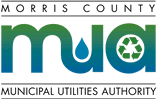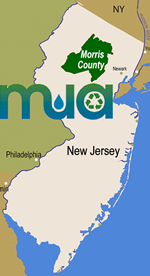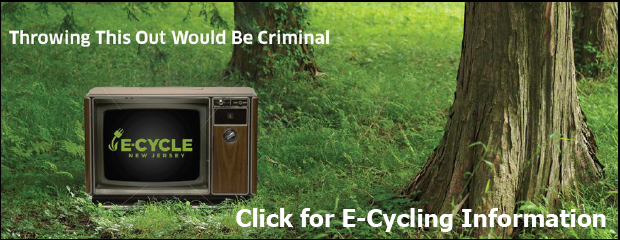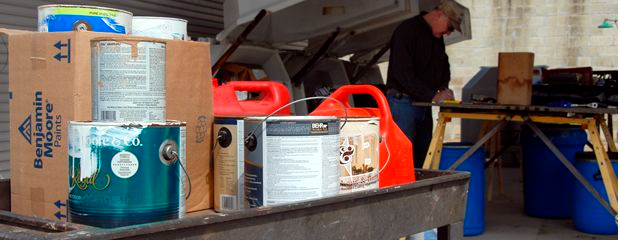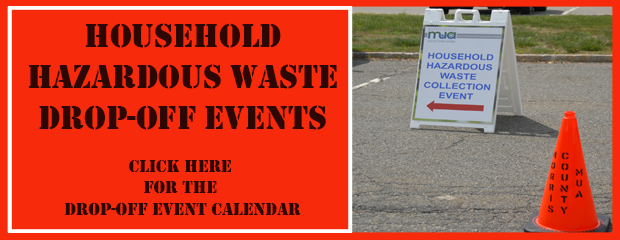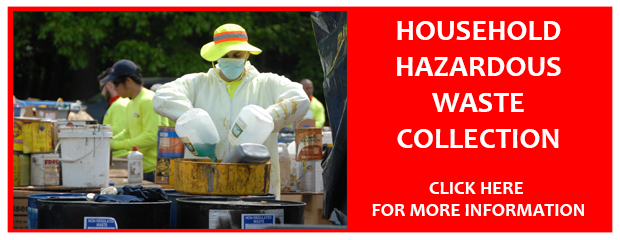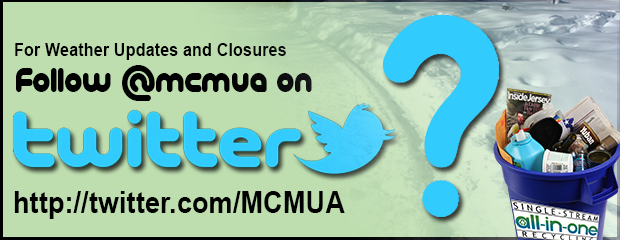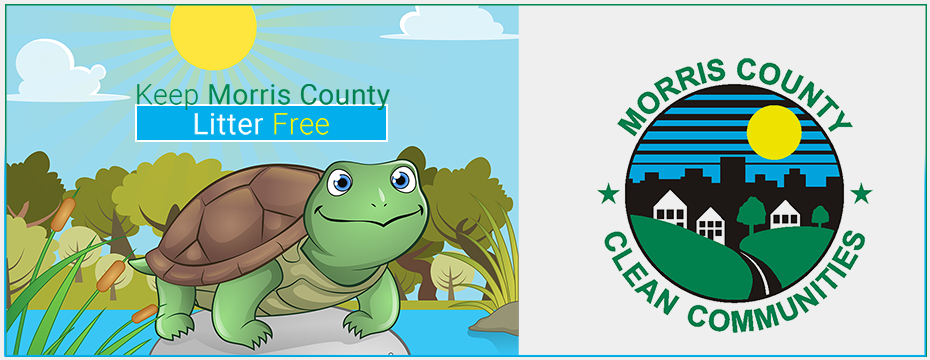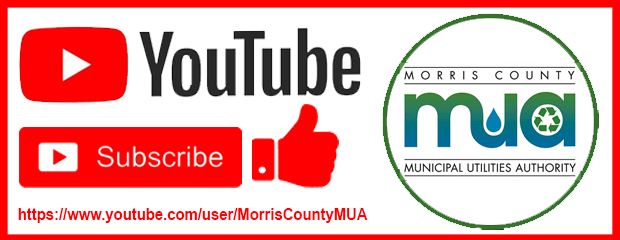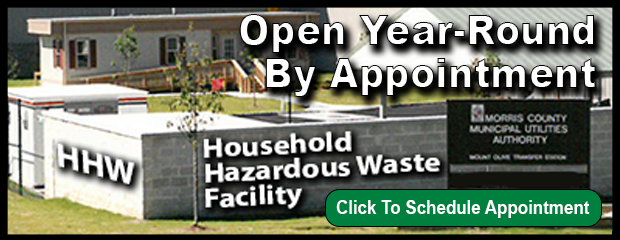Transfer Station Info (Tip Fee $113.00/ton)
- Mt. Olive Mon-Fri 7:30am-3pm; Sat 7:30am-11am
- Parsippany Mon-Fri 7am-3pm; Sat 7:30am-11am
- No Rental Trucks
- Payment by Account, Check, Credit Card. No Cash
Hazardous Waste Materials
- Adhesives
- Aerosols
- Antifreeze
- Appliances (CFCs)
- Art & Crafts
- Asbestos
- Batteries (Auto & Boat)
- Batteries, Household (dry cell)
- Cell Phones
- Compressed Gas Cylinders
- Driveway Sealer
- Electronics
- Fire Extinguishers
- Fluorescents
- Gasoline
- Medical Waste
- Kerosene
- Mercury
- Motor Oil & Filters
- Muriatic Acid (HCl)
- Paints & Stains
- Pesticides
- Photo Chemicals
- Pool Chemicals
- Propane
- Rock Salt
- Smoke Detectors
- Solvents
- Wood with Lead Paint
Who We Help and Serve
![]() Residents
Residents
At home we have hazardous wastes...
![]() Businesses
Businesses
At work we have to do it right...
![]() Schools and Institutions
Schools and Institutions
Keeping it clean and safe, for the kids...
Find it Fast
- Permanent HHW Facility
- HHW Disposal Days
- Acceptable Materials List
- Unacceptable Materials List
- Materials/Facility List
- Facilities/Materials List
Schedule HHW Drop Off
Schedule HHW AppointmentFlyers/Brochures
General HHW Rules
In 1998, the MCMUA opened a year-round household hazardous waste facility located at the MCMUA’s Mount Olive transfer station. This facility operates by appointment only on select Tuesday and Friday mornings, from 9 a.m. to 10 a.m., and most Saturday mornings, from 9 a.m. to 10 a.m. Using the facility is free of charge to Morris County residents delivering residential HHW (fees are charged, however, for propane cylinders and latex paint if delivered).
Call the MCMUA if you have questions at (973) 285-8394.
In addition to the permanent HHW facility, the MCMUA continues to operate several individual HHW disposal events at differing locations. At least one HHW disposal event per year is held at the Morris County Public Safety Training Academy. All HHW disposal events are held either in the spring or the fall and serve Morris County residents with residential HHW. Note: Businesses, municipalities and out-of-county residents are not allowed to participate in the MCMUA one-day HHW disposal events. Please note, the one-day hazardous disposal days do not accept any E-waste. Please call 973-285-8394 for information and to discuss recycling options.
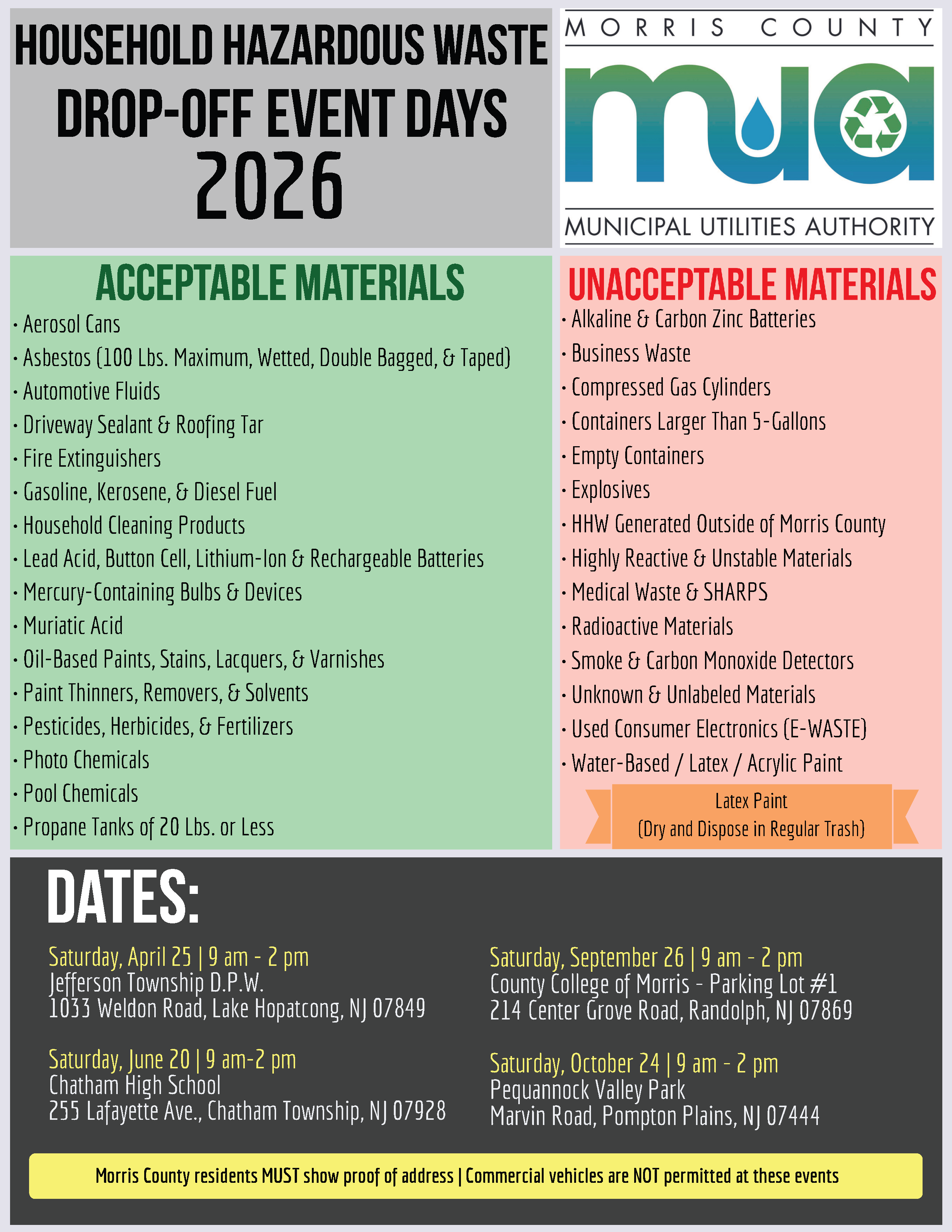
Acceptable Materials at MCMUA Household Hazardous Waste Programs
- There are no maximum amounts of household hazardous waste that Morris County residents may bring per visit, except no more than 55 gallons of used motor oil and no more than 100 lbs of asbestos per person. Note: no one may drop off 100 lbs of asbestos multiple times as a means to dispose of more than 100 lbs of asbestos as part of the MCMUA's hazardous waste program.
- Materials will not be accepted in containers larger than five gallons in size.
- All materials must be in clearly marked containers with the contents identified.
Common examples of acceptable materials include the following:
- adhesives
- aerosol cans
- asbestos in small quantities, must be under 100 lbs., wet down, double-bagged, sealed with duct tape, and sized to fit into 55-gallon drums
- automotive cleaning products
- automotive fluids such as oil, antifreeze and brake, diesel, transmission and steering fluids, etc.
- automotive used oil filters
- batteries for car, boat, motorcycles and/or ATVs (lead-acid)
- batteries, if they are rechargeable (NiCd, NiMH, Lithium-Ion) and/or hazardous dry-cell batteries (button-cell and lithium). Note, all rechargeable batteries must be small enough to fit in a box no bigger than 12" x 6" x 4". As such, many e-bike, ATV, hover-board, etc. batteries will be too large, cannot be accepted and must be returned directly to the manufacturer. Alkaline batteries are not hazardous and are not accepted (put them into the garbage).
- caulks
- caustic cleaning materials
- cooking oils (vegetable, peanut oil, etc. can be new or used)
- corrosive liquids and solids
- driveway sealant and roofing tar if they contain coal tar or petroleum distillates
- fire extinguishers
- flammeable liquids (lighter fluid, diesel fuel)
- fluorescent light bulbs and CFLs (compact fluorescent lights) that contain mercury
- gasoline/diesel gas (must be transported in a certified gas can)
- household hazardous cleaning products - must be considered hazardous but note, most are not hazardous.
- kerosene
- muriatic acid
- nail polish and nail polish remover (acetone)
- oil-based paints and varnishes, stains, lacquers (liquid or solidified)
- pesticides, herbicides, fertilizers (bug sprays, bug killers, home defense and repellents)
- photography and printing chemicals (fixers, toners and inks)
- pool chemicals and chlorine
- propane cylinders (BBQ-sized propane cylinders cost $5/cyl. at the permanent HHW facility and there is no charge for camping stove-sized propane cylinders)
- solvents and paint thinners
- thermometers and thermostats containing mercury
Unacceptable Materials at MCMUA Household Hazardous Waste Programs
The following materials are unacceptable at HHW programs:
- Explosives or highly reactive materials since these may be dangerous! Always call first for safety instructions. DO
NOT bring these materials without prior authorization! These dangerous items include, but are not limited to the following:
- ammunition
- benzoyl peroxide
- bromine
- calcium carbide
- "Dangerous When Wet" materials e.g. sodium metal
- ethyl ether
- fireworks
- isopropyl ether
- perchloric acid
- Pentachlorophenol (from older cans of Woodlife)
- picric acid
- Materials in containers larger than five (5) gallons in size
- Materials in unlabeled containers and/or containers with unknown contents
- E-waste and/or used consumer electronic waste is not accepted at one-day hazardous waste disposal events.
- Dried, hard, solid latex paint or empty paint cans; these are accepted for disposal at the transfer stations with other non-hazardous solid waste. Residents should remove the lids from these dried-out cans and dispose of both types into their household garbage.
- Latex or water-based paints are not hazardous and are not accepted at MCMUA hazardous waste disposal programs. Latex paint may be safely disposed of in the garbage when it is dried out. Dry out latex paint cans by stirring absorbent material such as cat litter into the paint. The paint will harden within a few minutes. Leave the lid off the can, put the lid and the can into the regular garbage. A hazardous waste handling fee of $2.00 per pound is charged for latex paint. Latex paint will not be accepted whatsoever during one-day hazardous waste disposal events.
- Appliances such as microwave ovens, washers, dryers; freon-containing appliances such as refrigerators, freezers, air conditioners, humidifiers
- Biologic agents
- Compressed gas cylinders (oxygen, acetylene)
- Rock Salt
- Construction materials such as wood, brick, treated lumber, asphalt, or concrete
- Radioactive materials or X-ray machines (ionizing)
- Regulated medical waste, including pharmaceuticals, syringes, sharps and needles
- Smoke and/or carbon monoxide detectors
- Tires
Household Hazardous Waste for the Resident
Household Hazardous Waste Links
How do I get rid of paint?
Click here for information regarding management of paint, including latex paint.
How do I recycle electronics?
Click here for information regarding management of electronics (E-waste).
How do I recycle refrigerators, air conditioners or dehumidifiers with freon or CFCs?
Click here for information regarding management of appliances and freon or CFCs.
How do I dispose of smoke detectors?
Click here for information regarding the disposal of smoke detectors.
Hazardous Waste Information For Business
Q. Can a business use the MCMUA hazardous waste program?
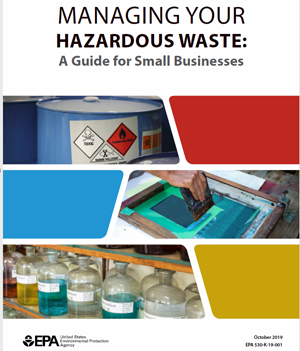 A. Pre-qualified businesses and institutions determined to be a Very
Small Quantity Generator (VSQG) may drop off
hazardous waste at the MCMUA's permanent HHW facility located
at the Mount Olive transfer station
by appointment and for a $2.00/lb. fee.
Very Small Quantity Generator (VSQG) Approval Form - Must be completed by all VSQGs prior to establishing appointment to drop-off any hazardous waste.
Business or institutional waste is not accepted at MCMUA one-day hazardous waste disposal programs.
A. Pre-qualified businesses and institutions determined to be a Very
Small Quantity Generator (VSQG) may drop off
hazardous waste at the MCMUA's permanent HHW facility located
at the Mount Olive transfer station
by appointment and for a $2.00/lb. fee.
Very Small Quantity Generator (VSQG) Approval Form - Must be completed by all VSQGs prior to establishing appointment to drop-off any hazardous waste.
Business or institutional waste is not accepted at MCMUA one-day hazardous waste disposal programs.
- Click here to refer to a guide prepared by the EPA in October 2019 called, "Managing Your Hazardous Waste: A Guide Foe Small Businesses."
- Click here to view a fact sheet summarizing the Requirements for a Very Small Quantity Generator
Q. Are there rechargeable battery recycling programs for businesses?
Call2Recycle® will provide free-of-charge drop-off boxes to any business for the collection and recycling of their own rechargeable batteries. All one has to do is sign up online at http://www.call2recycle.org. Retailers open to the public will be listed on the Call2Recycle® zip code locator and toll-free help-lines to encourage residents to recycle. Additionally, businesses can still participate in the Call2Recycle® program without being advertised as a public drop-off location if they do not want to listed as such. Since everything is free of charge, the MCMUA is encouraging every business and/or public agency to request a drop-off box for its office or work site. Click here for more information about household battery recycling/disposal.
Hazardous Waste Management for Governmental Institutions
Q. Can a governmental institution and/or school use the MCMUA hazardous waste program?
A. Pre-qualified institutions may drop off hazardous waste at the MCMUA's permanent HHW facility located at the Mount Olive transfer station by appointment and for a fee. Institutional waste is not accepted at MCMUA one-day hazardous waste disposal programs. Call 973-285-8394 for more information.
Q. Can governmental institutions recycle rechargeable batteries with Call2Recycle® ?
Call2Recycle® will provide free-of-charge drop-off boxes to any public entity for the collection and recycling of their own rechargeable batteries. All one has to do is sign up online at http://www.call2recycle.org. Public drop-off sites open to the general public will be listed on the Call2Recycle® zip code locator and toll-free help-lines to encourage residents to recycle. Additionally, institutions can still participate in the Call2Recycle® program without being advertised as a public drop-off location if they do not want to listed as such. Since everything is free of charge, the MCMUA is encouraging every public agency to request a drop-off box for its office or work site. For those public entities that utilize 2-way radios such as police, fire, public works and emergency services, the Call2Recycle® program is a great way to conveniently manage the rechargeable batteries that are generated and need to be recycled. Click here for more information about household battery recycling/disposal.
